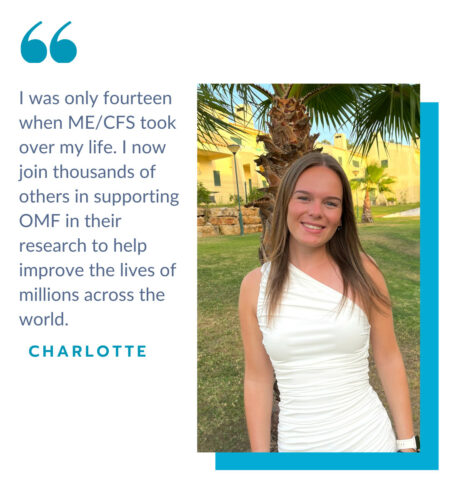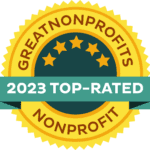Today, we are privileged to bring you the narrative of extraordinary courage, resilience, and strength. At just 14 years old, Charlotte’s life took an unexpected turn with a diagnosis of ME/CFS.
Read Charlotte’s story in her own words:
“My name is Charlotte; I am 18 years old, and I have been living with ME/CFS for around five years now. I was diagnosed with ME/CFS on the 19th of July 2019, after being ill since 2018. This made me only 14 years old when I received the heartbreaking news that it was unlikely I would ever recover.
 This would be hard for anybody to comprehend, but as a child, it made it so much more challenging to try and come to terms with. I felt the low quality of my future had essentially just been laid in front of me, and after all, I was only 14; I had barely lived. I had walked to and from school every day, spent time outside of school with friends, and played a lot of netball – all the things a teenager should be doing. After falling unwell, all of this had to come to a halt very rapidly, and I could suddenly barely make it through a full day of school.
This would be hard for anybody to comprehend, but as a child, it made it so much more challenging to try and come to terms with. I felt the low quality of my future had essentially just been laid in front of me, and after all, I was only 14; I had barely lived. I had walked to and from school every day, spent time outside of school with friends, and played a lot of netball – all the things a teenager should be doing. After falling unwell, all of this had to come to a halt very rapidly, and I could suddenly barely make it through a full day of school.
I was overwhelmed with both symptoms and emotions, neither of which I knew how to effectively deal with. I didn’t know anyone else in my position, was unable to do any of the things my friends could do, and more crucially, I was unable to do any of the things I myself could once do. I felt like I was watching everybody else’s lives pass by me while I was stuck in the same position (usually in bed).
For a long time, I had a firm hold of my self-destruct button. I thought if I told myself I was okay, then that would mean I would feel okay, and I could carry on like everybody else. Newsflash – didn’t work! I refused to be seen in a wheelchair, as people my age shouldn’t have to use one of these. I told as few people as possible because if I didn’t understand what was happening, then how could I expect anybody else to? Most people wouldn’t know I was unwell anyway; after all, they only see me when I am well enough to be seen.
It didn’t take long to forget what a life without constant pain and fatigue felt like. Spending so much time alone in bed, it was far too easy to get lost in my thoughts – what if I hadn’t gone on that one day out? What if I hadn’t touched that one chemical? Would I have escaped this form of torture? Had I sabotaged my own future without even realizing it? Everything else seemed pointless – if there was no getting better, then why bother trying?
However, it took me all too long to come to terms with the fact that while there isn’t necessarily a full recovery, there is room for improvement. While I couldn’t get better, one thing was for sure – I could certainly get worse. I was painfully aware that a return to my old life was unrealistic, but I could develop a new future for myself. Maybe it’s not what I originally pictured, and it’s not always going to be pretty, but it’s a future nonetheless.
After years of learning how to pace myself and adjusting to what my body can and can’t manage, I am now at university completing a law degree! I appreciate this wouldn’t be possible for many people with ME/CFS, so I am incredibly grateful to have reached a stage where I am able to pursue this. It isn’t easy, and my university experience is certainly very different from my friends, but I have in fact made it to university, which is a huge achievement for me.
I have learned that while those around me might not understand what I am going through, the only way they will gain any kind of knowledge of my situation is through me talking to them. I have gradually begun to accept that mobility aids are only there for my benefit and simply allow me to experience things that I wouldn’t otherwise be able to. There is no denying that it has been, and will likely continue to be a difficult journey, but the most important thing I have learned so far is that I have the strength to keep going even when it feels like it might be impossible to do so… and I am certain that you do too.”
What gives you hope?
Your story, like Charlotte’s, carries profound power. By sharing our experiences, we not only support each other but also contribute to a greater understanding of ME/CFS and Long COVID. We invite you to add your voice to the ‘Voices of ME’ web portal, a space where your story can resonate with others, offering connection and understanding to those navigating the challenges of ME/CFS and Long COVID.
Let’s make sure that every voice is heard, every story is honored, and that together, we move closer to a future free from the limitations of our disease.


